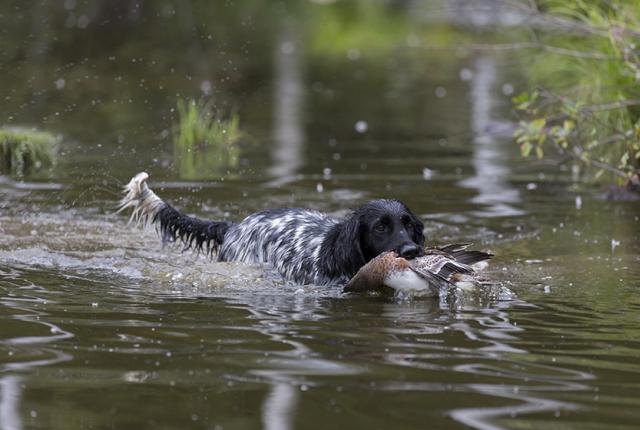The Kennel Club has hosted the first of its Judges Competency Framework (JCF) ‘Eye for a Dog’ assessments and received valuable feedback. Run in an innovative collaboration between the Kennel Club and Finnish Kennel Club, the 72 places for the pilot were fully booked within three days of invitations being issued.
The Eye for a Dog assessment is a key component of the JCF and a necessary requirement to attain JCF level 3 (equivalent of current A3 list). This one-off assessment is also required in order for a judge to be approved to award Challenge Certificates (JCF level 4) to a first or subsequent breed under the JCF.
Those invited to take part in the assessments were candidates who had passed multiple choice exams at recently-held pilot breed appreciation days, as well as group judges who are currently approved to award CCs in at least 70 per cent of eligible breeds in a group. Candidates ranged from judges on B lists right through to those who are approved to judge BIS at championship show level.
In the event, 68 candidates took part, split into morning and afternoon sessions of three hours on both days. Each candidate was required to participate in one of the four sessions, and afterwards much positive and constructive feedback was given to the Kennel Club, with candidates often commenting that the assessment had made them think carefully about the construction of a dog. The concept was widely welcomed by those taking part.
The pass mark for the assessment was 70 per cent or higher, with 65 per cent of candidates achieving this result.
The ‘Eye for a Dog’ test does not require
pre-knowledge of breed standards
The assessments were based on a similar concept which has been successfully organised by the Finnish Kennel Club for a number of years. The assessors were Kimmo Mustonen, Chairman of the Finnish Kennel Club’s Show and Judges Committee and Finnish KC Board member, as well as Jeff Horswell, Chairman of the JCF Working Party, and Frank Kane, both of whom are Kennel Club Board members and experienced judges at home and abroad. Prior to the assessments taking place, Mr Kane and Mr Horswell had been assessed by Mr Mustonen and approved using the stringent Finnish system.
Each candidate was required to demonstrate possessing an ‘eye for a dog’ by having their competence in canine conformation and movement examined. The assessment did not require any pre-knowledge of breed standards or breed specifics, but sought to assess knowledge of conformation and movement at the appropriate level for a judge awarding CCs.
Nine dogs and handlers were required for the assessment, comprising at least one breed from each of the seven Kennel Club groups, covering a variety of shapes, sizes, coat types etc. The Kennel Club is most grateful that a number of owners came forward and freely offered their dogs to be used in the assessments. Candidates were assessed on their knowledge of movement, head and neck, forequarters, body (to include proportions, coat and colour) and hindquarters.
Candidates scored extra marks for the correct identification of the breeds as well as for two observations conducted by official observers Gerald King, Kennel Club Training Board Chairman, and Dr Ruth Barbour, Kennel Club Accredited Trainer.
The catchphrase of the day was very much ‘say what you see’, as those taking part had been encouraged in the candidate briefing to describe exactly what they saw. The assessors wanted to see descriptions such as ‘short neck’ rather than ‘correct neck’, for example. The reasoning behind the assessment is to develop the candidate’s general canine knowledge to the standard expected of someone approved to award the Kennel Club’s premier award, the Challenge Certificate.
Feedback from the assessment was excellent
Jeff Horswell of the Kennel Club said: “Many people have long felt that there was a gap in the Kennel Club’s ‘generic’ judge training; whilst there is an excellent conformation and movement seminar supported by films and other material on the Kennel Club Academy, no comprehensive assessment of the knowledge gained existed, unlike for the Kennel Club rules and regulations.
“The Scandinavian countries are known for the rigour of their judges training and it was decided to look there for a possible solution. The Finnish Kennel Club seemed to have just the thing we were looking for in their ‘Eye for a Dog’ test, which you have to pass to be considered for their judges training programme.
“It seemed that luck was on our side. The Finns were in London last summer for the world congress, so I was able to meet with them to discuss their test and the possibility of the Kennel Club using this concept. They hold tests only every three years and again luck was on our side as their next test was due to be held in September 2017, so a couple of the Kennel Club’s education team were able to attend to see how the assessments are organised.
“Feedback on the assessments at Stoneleigh has been excellent. Some necessary tweaks have been identified, and these will be addressed, but the concept of assessing knowledge and getting judges to think in a different way seems to have received a big thumbs up.”
Kimmo Mustonen of the Finnish Kennel Club said: “The event came off quite well and the arrangements were successful. You could really feel the excitement in the air and the candidates were enthusiastic.
“The assessment can be further developed as more experience is gained. I strongly believe that the Eye for a Dog assessment will find its place in the new system for education of judges in the UK. Correspondingly, the Finnish Kennel Club can also learn from the Kennel Club’s educational system. For instance, the Kennel Club has drawn up excellent presentation and educational material for their judges’ education. The cooperation between the Finnish Kennel Club and the Kennel Club is worth continuing.”
Further JCF Eye for a Dog pilot assessments will be organised later this year and in 2019 once the recent pilot assessments have been fully analysed. The Kennel Club will provide details of dates and eligibility nearer the time.




 Hau-Hau Champion
Hau-Hau Champion Agria
Agria